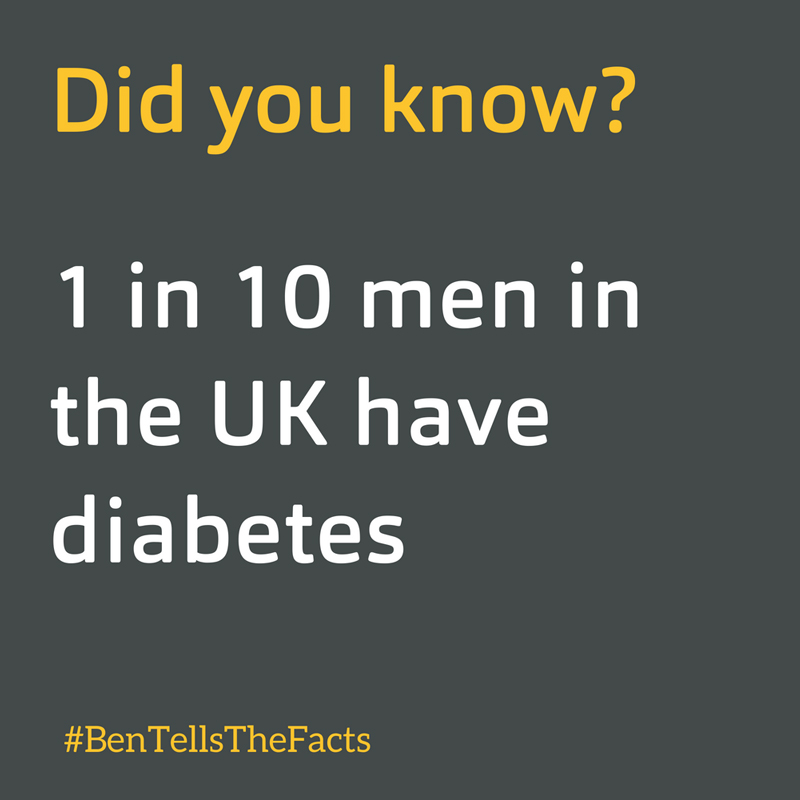
Ben, the not-for-profit organisation that partners with the automotive industry to provide support for life to its people, has highlighted some of the top health issues that affect men.
On average 1 in 5 men in the UK die before retirement age of 65, with more than 2 in 5 not making it to 75.
This Men’s Health Week, we’re highlighting some of the top health issues that affect men so you know what to look out for, how to make healthier choices and where to go if you need help.
1. Diabetes
The theme for this year’s Men’s Health Awareness Week is diabetes – and with good reason. 1 in 10 men have diabetes with men 40% more likely to die prematurely of the disease than women.
Diabetes is a condition that affects the way your body processes sugar, causing blood sugar levels to become too high. There are two types of diabetes… Type 1 happens when your body can’t make any insulin, the hormone that allows sugar in our blood to enter our cells. 10% of diabetics have type 1 which has nothing to do with diet or lifestyle.
The other 90% of diabetics have type 2, where they produce insulin but it doesn’t work properly. Risk of type 2 diabetes is increased by factors such as being overweight, smoking, or not exercising enough. Its symptoms can often be controlled through lifestyle changes. It’s estimated that an additional 1 million people in the UK don’t know that they are living with Type 2 diabetes.
To find out more about the symptoms of diabetes, risk factors and treatment read the Men’s Health Forum’s informative guide: https://www.menshealthforum.org.uk/diabetes-men
2. Loneliness
1 in 8 men across the UK have no close friends, according to a survey funded by the Movember foundation. This amounts to 2.5 million British men with no friends to turn to for support during a crisis.
Men are less likely than women to prioritise friendships and often lose touch with their social network once they have left school or university, instead focusing on their career and romantic relationships. A total of 1 in 10 men surveyed couldn’t remember the last time they’d made contact with their mates, with married men less likely to have support outside of the home than their single counterparts. This can have a big impact on men’s mental health and overall wellbeing, especially if their romantic relationships break down.
If you’re feeling lonely, why not try giving an old friend a call? You might find that they’ve been feeling alone too and your call could be just what they need. If it’s new friends you’re looking for, sports teams and organisations such as Meetup group and Men’s Shed are a great way to meet other guys. For more advice on loneliness you can read our blog.
3. Prostate cancer
Earlier this year, prostate cancer hit the headlines as the number of men dying from prostate cancer overtook the number of women dying from breast cancer for the first time in the UK.
The prostate is a walnut sized-gland that sits underneath the bladder and helps to make semen. Prostate cancer makes up to 26% of male cancer cases followed by lung cancer (13%) and bowel cancer (13%). It mostly affects men over the age of 50, with black men twice as likely as Caucasian men to develop the disease.
A total of 4 in 10 prostate cancer cases are diagnosed late making it more difficult to treat. So, look out for changes in the way you pee. If you have a weak flow, notice blood in your urine, struggle to empty your bladder or experience an increased or sudden need to urinate, visit your GP to get your symptoms checked out. Getting things checked early on can make all the difference.
For more information visit Prostate Cancer UK. If you need support coping with cancer read our blog or call our helpline: 08081 311 333
4. Heart disease
Heart disease is the leading cause of male death in the UK, with 119,000 men having a heart attack each year, compared to 69,000 women.
Risk factors for heart disease include: smoking, being overweight, having high cholesterol or blood pressure and having diabetes. Look out for warning signs such as: chest pain, feeling sick, arm, jaw or back pain, feeling sweaty, and extreme tiredness.
Check out the British Heart Foundation’s 10-minute challenges for some easy ways to improve your heart health. Quitting smoking, cutting down on alcohol, and eating a healthy diet high in fruits and vegetables and low in salt and saturated fat can all help to reduce your risk of developing heart disease.
5. Suicide
A massive 75% of suicide victims in the UK are male, with suicide the single biggest killer of men under 45.
It’s not just young men that are at risk. 45-47 year-old men are the most likely group to commit suicide, whilst nearly as many men over 50 commit suicide as under 45s.
There are many factors that make men more vulnerable to suicide. Men are often under pressure to appear strong and not show signs of weakness, making them less likely to seek help when they are struggling with their mental health. Men are also more likely to respond to stress with risky behaviour such as abusing alcohol which increases the risk of suicide by up to eight times.
Relationship breakdown has a bigger impact on men’s suicide risk than women’s – divorced men are three times more likely to commit suicide than their married peers, whereas divorced women show no increased risk.
Warning signs to look out for in yourself and your friends include:
- Talking about wanting to die
- Withdrawing or feeling isolated
- Talking about being a burden to others
- Experiencing extreme mood swings
- Drug or alcohol misuse
- Feelings of anger, hopelessness or disconnection
- Giving away possessions
- Giving up previously loved activities
- Writing goodbye letters
- If you’re worried about suicide you can call the Samaritans free, at any time on 116 123 and if a life is in immediate danger call 999.
6. Addiction
Did you know that men are three times more likely than women to be alcohol dependent and twice as likely to be drug dependent?
Addiction is a condition where you compulsively use a substance or carry out a behavior that causes you harm. Common addictions include gambling, drugs, alcohol, nicotine and work addiction.
Warning signs of an addiction include:
- A strong desire to take a substance (e.g. drugs) or carry out a behaviour (e.g. gambling)
- Difficulty in stopping or controlling said behaviour
- Suffering from withdrawal symptoms
- Needing to take more of the substance or carry out more of the behaviour to achieve the same effect
- Neglecting other interests or relationships to the point where the addiction is taking over your life
If you’re struggling with an addiction the important thing is to get help. Alcoholics Anonymous is a great organisation for those with alcohol addiction, whilst Frank offers support with drugs.
If you’re looking for tips to quit smoking visit our blog for advice. The NHS also has support for other addictions.
For more information on men and addiction read this great article from netdoctor.
7. Back pain
Back pain is the biggest cause of disability in the UK and was highlighted as a key issue for concern in our automotive industry survey.
It is estimated that 8 out of 10 people in the UK will suffer from back pain at some point in their lives. Lower back pain is the most common but it can affect people anywhere along the spine from the neck to the buttocks.
It’s important to look after your back to avoid back pain. Strengthening the muscles with daily back exercises or low-impact activities such as swimming or yoga is a great way to keep your back fit and flexible.
If you sit at a desk all day, make sure to set up your workspace correctly to reduce the risk of straining your back, and if you ever need to lift a heavy object remember to bend from the knees. For more advice on looking after your back check out this informative guide from the NHS and try not to fall for the common back pain myths!
We’re here for you
If you’ve been affected by any of these issues Ben is here to help. We provide support for life to anyone who works or has worked in the UK’s automotive industry and their family dependants.









